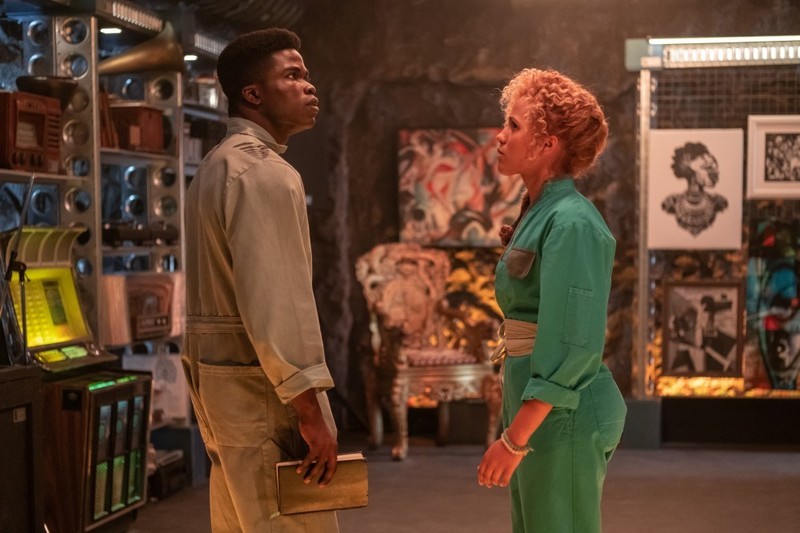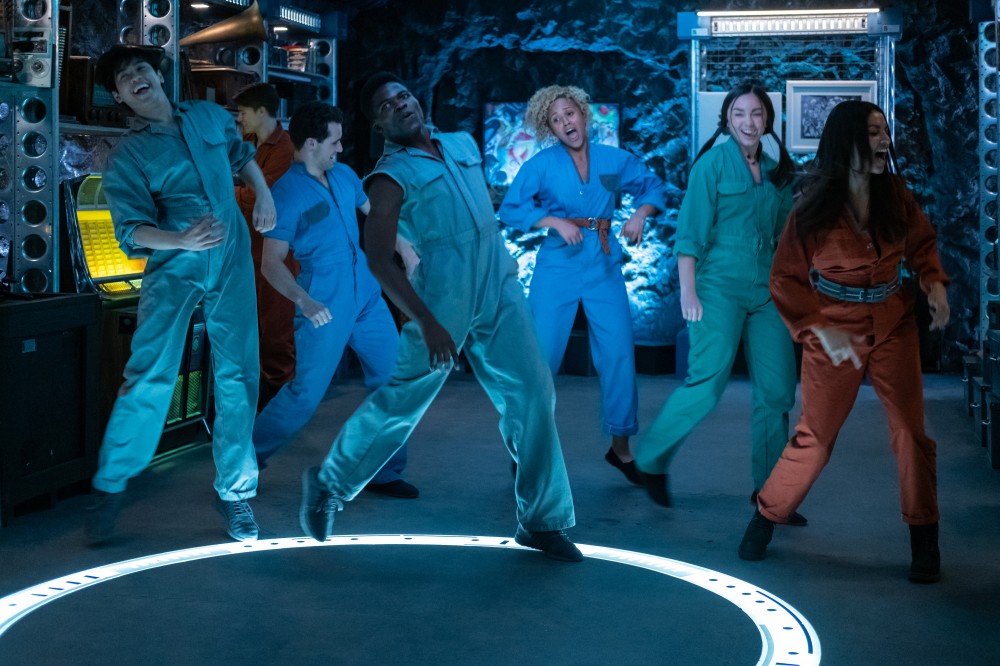“Utopia Falls” is a new sci-fi series about how the discovery of hip-hop can inspire individual liberation, and seeing even a supposedly perfect world in a whole new way. It’s dressed up like dystopian YA series of past (“The Hunger Games” and “Divergent,” for example), but instead of a revolution that starts with violence, it’s the exposure of our culture that leads the children of the future to questioning a type of system that, on the outside, appears to have found order. “The Hunger Games” had Katniss rallying the people of Panem with three fingers, but “Utopia Falls” has a group of young people discovering, and then seemingly be possessed by, the words and beat of Kendrick Lamar’s “DNA.”
This new series from creator R.T. Thorne is assuredly not like anything else on TV, and even touts itself as “the first ever sci-fi hip-hop TV series.” But it can lose its impact with its its own broader construction, including the one-dimensional, high school-like dramatics for its mass of young actors. Through episodes that have large gaps of intrigue, the revolution within “Utopia Falls” relies too heavily on sci-fi tropes as its language to communicate to viewers in 2020 about the importance of the culture and history we still have.
The last living colony on Earth, Utopia Falls is presented in the pilot’s opening scenes as indeed a type of place where peace has been figured out, and no one questions how they’re being treated. Yes, there are different classes so to speak: Bodhi (Akiel Julien) is from a place called Reform, which is like the lower-class; Aliyah (Robyn Almoar) unwittingly enjoys a higher privilege being the daughter of a Tribunal. But everyone follows the colony motto of “Trust the Authority,” and the young people excitedly participate in this show’s version of the the Hunger Games: a dance competition called the Exemplar, meant to pay tribute to the colony’s founder, Gaia.

Everything changes by the end of episode one, when Bodhi and Aliyah discover a secret space at the edge of the colony called the Archive. It’s like a giant storage locker with a lot of unknown-to-them books, art, and a guiding voice—Snoop Dogg’s—who shows them different examples of culture, including hip-hop. The knowledge inspires both of them, and Bodhi even leaves The Archive as a new type of rapper who can freestyle, and questions more about himself and where he comes from. Bodhi and Aliyah pass along the knowledge of the Archive with their peers, and it starts to affect how they dress and perform for the Exemplar. Authority is not pleased, and when they arrest Bodhi for dissension, the teenagers use their newfound knowledge of stepping and the Civil Rights movement to protest. That’s just the spark for how “Utopia Falls” heads toward revolution, and its ultimate dance competition.
The series has a bizarre problem with the construction of its world, as it doesn’t make you clearly aware of just how removed hip-hop is from the world, or the other culture that specifically isn’t allowed. This isn’t like the sci-fi movie “Equilibrium,” in which all creators of feelings were taken away, instead it’s select art—you might hear the melody of “Rapture” by Blondie used as part of an Exemplar dance routine in the beginning, but that’s before learning that it’s hip-hop that has been taken out of culture. You don’t have a strong idea of exactly what art, and art forms, have and have not been banned from this society that uses dance as one of its greatest cultural expressions.
“Utopia Falls” can be ideologically ambitious with its intricate ideas of how to encourage viewers to question everything, especially as this place does seem like a utopia from its exposition-heavy introduction. This best of the storytelling comes out in its critique of the society’s approach on diversity. As one figurehead says, “We embrace diversity. It’s our strength. But personal expression is something else … it fosters disharmony.” That’s a bold idea for a series to put out there—to challenge the pat nature of a system that touts diversity only on the surface—and it leads to some sharp ideas about privilege, especially as Bodhi (whose personal arc is the story’s best) starts to see what his community means to higher authorities, and that those figures are also trying to mute his newfound rapping skill. It’s interesting, too, to see a show that uses the commodification of this expression as a central part of its drama, like when they encourage Bodhi to do this new rhythmic word thing, but with a text that he’s given.

At times, “Utopia Falls” has a “where is this going?” weirdness that keeps it stable as a light watch, even though you’ll wish that the drama in between the revolution was richer, and that the characters were more colorful their single-color jumpsuit uniforms. Thorne’s series can only do so much with its relationship struggles between its characters, like the love triangle between Bodhi, Aliyah, and Tempo (Robbie Graham-Kuntz), or the growing feelings between Brooklyn (Humberly Gonzalez) and Sage (Devyn Nekoda). Some of the drama is spiked more with the revolutionary stuff, and the teens have to play it like aliens discovering footage of young women stepping, or listening to Nas’ Illmatic. These scenes are kind of corny too, but the sense of amazement in learning about this stuff is sold with utmost sincerity from the cast.
“Utopia Falls” is the kind of show that has a limited idea of fresh storytelling and instead leads with its heart, honing in what it would be like to see a landmark culture through innocent eyes. It’s all primed for a tween, teenager audience, and that’s certainly a feature, not a bug. But the series will most likely have the most impact if this is also your first time hearing in between the lines of Illmatic, or questioning the institutions around you.












